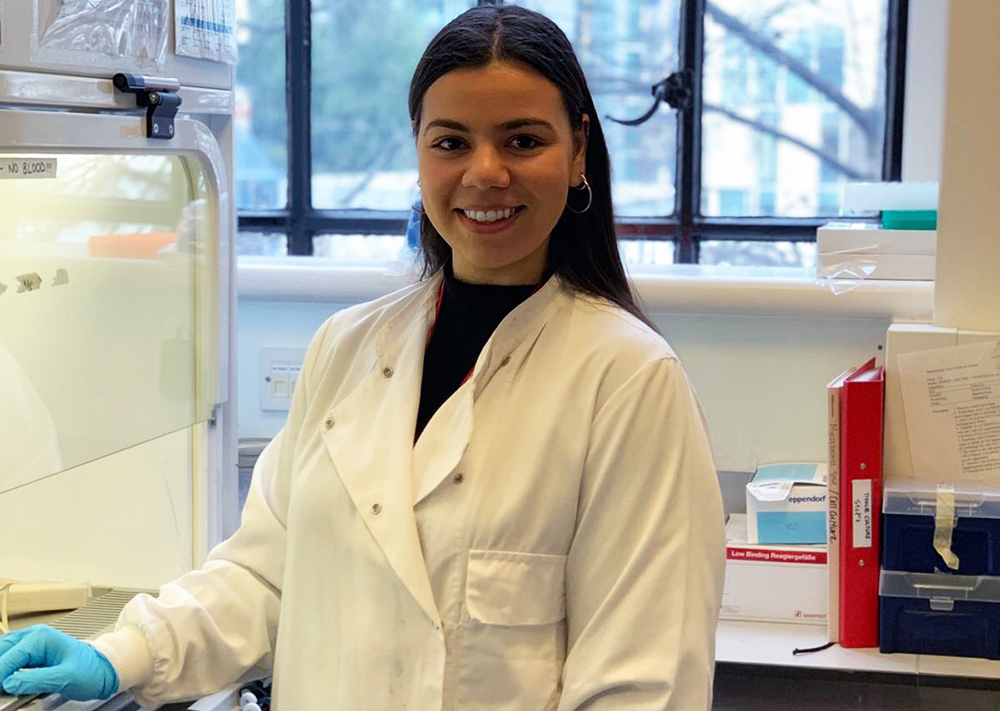
This post was originally published on the Department of Medicine Staff Blog on 25 April 2019.
In the latest instalment of our monthly profile series, we spoke to Stephanie Hodeib about life as a PhD student in the Department.
Introduce yourself – who are you and what do you do?
I’m Steph, and I’m currently a first-year PhD student based at the St Mary’s Campus in Dr Vanessa Sancho-Shimzu’s lab within the Department of Medicine. My research is in understanding the genetics behind infectious diseases in children.
When did you first join the Department, and where did you work or study before this?
I first joined the Department in October 2017 when I started my MSc in Molecular Biology and the Pathology of Viruses. Before this, I graduated with a BSc with Honours in Molecular Biology and Genetics at the University of Wolverhampton. I then undertook an internship at a hospital diagnostic laboratory in northern Italy for seven months before starting my Master’s.
What first inspired you to undertake a PhD, and why at Imperial?
I was born and raised in central London and I have always seen Imperial as the gold standard of scientific and medical research. I’ve always been in awe of the College, and being able to become a part of the Imperial community and contribute to research here is really a dream come true.
What has been your proudest professional achievement to date?
Being accepted onto a PhD project in a field I am passionate about at a highly regarded institution, and under a supervisor whom I greatly admire.
What do you think are the main challenges are facing PhD students right now?
Stress, time management and finances. It’s important to make sure you’re in a healthy and positive working environment, and that you communicate with your supervisor and those around you to make sure you stay emotionally and mentally healthy.
What advice would you give to someone considering pursuing a PhD?
Make sure it is in a field you are actually interested in, otherwise you won’t be motivated. Also, try to meet the members of the lab beforehand. Actually liking the people in your lab can really make the difference between a good postgraduate environment and an uncomfortable one.
What do you think the College can do to improve the working culture for PhD students and early career researchers?
I think the College is quite good at doing everything possible to provide a positive working environment for PhD students. Imperial provides a massive and diverse selection of workshops as part of the Professional Development Programme. There’s also a clear hierarchy on how to report any issues you’re having, as well as counselling services. However, I think the College doesn’t organise enough postgraduate social gatherings, particularly for those based outside the main South Kensington Campus. Being able to meet and talk to other students in the same position as you in a casual environment would be nice and encourage networking skills.
Where do you see yourself in five years’ time?
Hopefully still doing research that I love, in a healthy and productive working environment. I want to possibly spend some time working in a lab in a different country to challenge myself and gain new and unique experiences. I also want to become an advocate for encouraging more women in STEM.
What do you consider to be the key global challenges facing science and medicine that we need to overcome in the next 20 years?
It’s hard to predict for the next 20 years. There are obvious issues, such as climate change, antimicrobial resistance and the need to develop new medicines. However, I think communication, freedom of movement and information exchange will be increasingly important issues in the science and medical communities.
What are your biggest hobbies/passions when you’re not busy researching?
I volunteer and am involved in outreach, which is mostly aimed at getting young people and disadvantaged children motivated in education and encouraging an interest in STEM subjects. When I have a significant period of free time, I enjoy travelling and experiencing new places and cultures.
And finally: if you were exiled to a desert island but allowed one luxury item, what would it be?
My Spotify account (and also some kind of device that could play it).